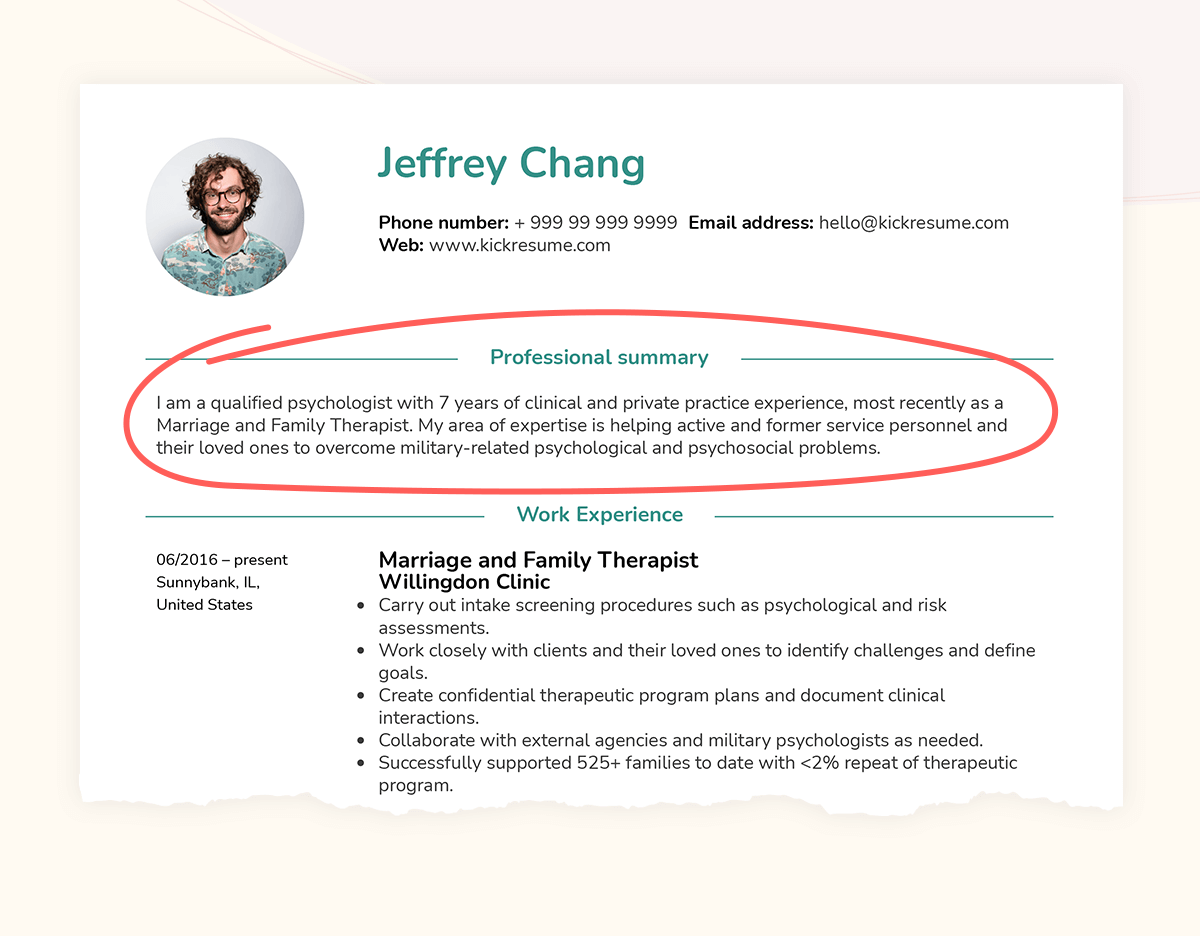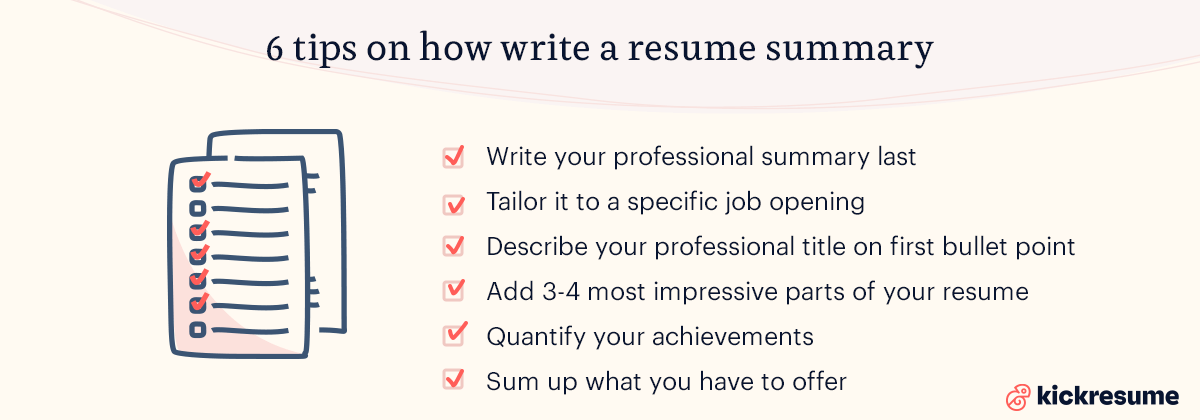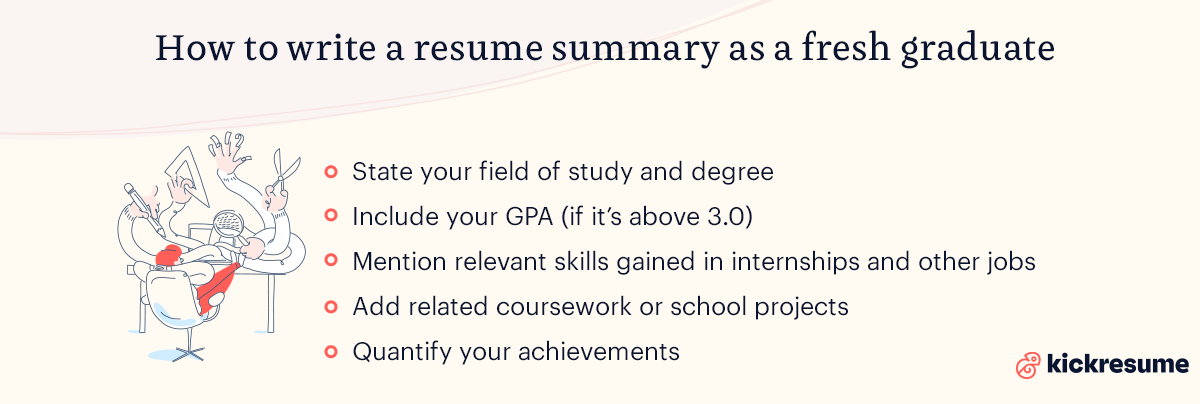
Learn to write a good professional summary. Get inspired by our best resume summary examples and make writing your resume's profile section easy.
Kaja Jurčišinová Staff Writer Last updated: May 20, 2024 Average: 4.2 ( 71 votes ) Table of contentsDo you want to land more job interviews? The easiest way to achieve this is by attracting a recruiter’s attention straight away by summarizing the highlights of your career right at the start of your resume — in a section called the resume summary.
The purpose of this resume section, which is also known as a professional summary or resume statement, is to create a good first impression. It sums up your work experience, skills, and achievements into a short and concise sales pitch where you are the product.
Do it well, and your future employers will be more inclined to read the rest of your resume.
Without further ado, let’s show you how to write an exceptional professional summary that will not only get you to more job interviews but will also help you land a job.
This guide will show you:
A professional summary gives the hiring manager a quick overview of your skills and achievements without them having to dive into the rest of your resume. It sits at the top of your resume, beneath your name and contact information. You can think of it as a teaser for the rest of your resume.
It should sum up your top skills, experiences, and achievements as they pertain to the job description.
Take a look at the sample below to see what it looks like in practice:
The professional summary section is also known as a:
However, don’t mistake a professional summary for a resume objective or profile. We’ll discuss the differences between them later in this guide.
Generally speaking, a resume summary should be quite short. The most common length is 3-5 sentences or bullet points. It shouldn't be longer than 5-6 concise bullet points, but it also shouldn't be shorter than 2 bullet points.
You can also replace the first bullet point with a short introductory paragraph that includes your job title, years of experience, and specialization.

While many people still don't include the resume profile section in their resumes, it's a mistake. But why is it a mistake?
The thing is, recruiters are busy people, they go through dozens, sometimes hundreds of resumes before they can find a few qualified candidates.
Do you know what this means? Shortcuts. At first, recruiters will be skimming resumes in search of specific keywords and phrases that align with what the company is searching for.
That’s why you want to include the best resume summary you can come up with because a good summary section consists of nothing but these juicy bite-size phrases and keywords that a recruiter can spot at a glance.
In short, a professional summary allows you to turn a recruiter's time limitation into an advantage.
While recruiters are indeed busy, did you know that the information that recruiters only give each resume 6 seconds of their time isn't true?
“This one's a little bit of a myth. It takes about six seconds to screen the resume for the key information that I'm looking for, such as location, summary, keywords, or if there's a skills section. Within this time frame, I should be able to get a feel for who you are and what you're looking for. But it's mainly about six seconds for me to pick out the basic information I need. It doesn't mean that I'm going to spend just six seconds on it or that I won't continue reading after.” — Christy Morgan, Kickresume's Resident HR Expert

As we said before, a good professional summary should compel an employer to read the next section of your resume — that’s all. If it manages to do that, then it has accomplished its purpose.
However, doing this is easier said than done, as it can be tricky to cram the most exciting bits of your career into a 3-5 bullet points summary.
Luckily, there are a few tips and tricks you can use to craft an impressive resume summary.
Before you start writing:
Once you start writing:
A professional summary can do more than catch the attention of the recruiter. It can also make your resume more ATS-friendly.
It's a great place where you can squeeze in one or two ATS-friendly keywords, and it will still look natural.
Such keywords can be your industry-relevant hard skills, previous job positions, notable clients, certificates and courses from notable institutions, or a note-worthy university (if you recently finished your degree).
Moreover, you should add keywords and relevant skills from the job listing.
Don't get too creative with the heading, though. While replacing the professional summary headline with “Snapshot” sounds great, ATS doesn't know what it means and therefore wouldn't recognize it.
Pro tip: Remember, while it's important to incorporate keywords into your resume summary, it's crucial to ensure these keywords align with your abilities and experiences. The ATS might shortlist your resume, but the hiring manager will quickly realize in an interview if those keywords were merely resume filler. Always maintain honesty and authenticity while drafting your summary.

Now that you know the ins and outs of writing a resume summary, here are a few examples that can inspire you when writing your summary:
Performance-driven and motivated customer service rep offering 4+ years of relevant experience. Eager to join the Techia team and contribute to the growth of the company. In the previous role, the ability to make customers comfortable and relaxed allowed for 98% customer service survey results and had 25% more sales than the average employer.
Dedicated and hard-working storekeeper with a Business Administration degree. Eager to bring my strong attention to detail and accuracy to J&R inc. Adept at communicating with vendors and suppliers, coordinating various business operations, and maintaining documents and files in order. In the past jobs brought an extra $50k of sales per quarter and increased customer satisfaction by 20%.
Motivational and resourceful Orthopedic Nurse with 10 years of experience with in-depth knowledge in trauma recovery, aggressive pain management techniques, and post-surgical recovery. Especially proficient in providing external fixation care and continuous motion therapy along with neuromuscular status monitoring. Committed to work as an orthopedic nurse for people who are struggling with mobility issues due to accidental injuries and degenerative disease affecting bones and muscles.
Self-driven and accurate Executive Assistant skilled at performing various office/administrative duties, such as coordinating meetings, maintaining calendar and schedule, filing documents, and managing company correspondence. Highly self-motivated with a solid work ethic and multitasking abilities.
A graduate in Information Systems with two years of hands-on data analytics experience. Passionate about working with large amounts of data and to turn this data into information, information into insight and insight into business decisions. I also have a keen interest in the field of data visualization and am fascinated by the power to compress complex datasets into approachable and appealing graphics.
Hard-working and dedicated Warehouse Worker with 2+ years of extensive experience in inspecting incoming shipments, preparing and processing orders, and performing various administrative duties. The Employee of the Month Award winner with a strong attention to detail and accuracy and determination to achieve exceptional results. Offers excellent time management skills and important ability to work independently or in a team.
Customer-oriented and performance-driven Front Desk Assistant skilled at performing various administrative tasks, improving all office processes and procedures, and providing support to Office Managers. Great communicator with a Business Administration degree from a well-known university and an exceptional ability to remain calm in stressful situations. Possess well-developed communication skills and excellent time management abilities.
A Project Manager with 16 years of experience in IT projects. Responsible for the management of teams of up to 15 direct and 7 indirect employees. Has High level knowledge in project execution using best practices of waterfall and agile methodologies. High level knowledge of Jupyter Notebook, MS Project, MS Excel, MS Word.
Logistics & Planning PMO for Anheuser-Busch InBev with +7 years of experience in Supply Chain Operations & Project Management. Lived and worked for ABI in 6 cities in past years, managed +300 direct & indirect employees and +0.5 billion BRL over the years. At ABI experienced the routines in breweries operations & urban distribution. As Project Manager build the Zone Logistics Project area for ABI LAN, being responsible for 4.0 Supply Chain, integrating the technologies WMS, YMS, TMS and Tracking.
Performance-driven and knowledgeable Stay At Home Mother skilled at conducting detailed market research, developing new sales tools, creating reports, and promoting products and services. Certified Marketing Management Professional with an extensive knowledge of multiple marketing software programmes, great communication skills, and excellent teamwork abilities. Currently looking for any Marketing related remote part-time job.
Self-driven and knowledgeable computer science student with demonstrated experience in developing user-friendly software applications, coding and testing features, and providing engineering support. Oracle Certified Professional with extensive knowledge of multiple programming languages and software development tools, excellent problem-solving skills, and ability to perform well in a team.

If you’re a student or a fresh graduate, you probably don’t have much to brag about in your resume yet.
But that’s true only to some extent. Even as an entry-level candidate, you already have at least some experience and skills. You just have to find the right way to articulate them.
What’s more, it’s quite likely that the other candidates are just as inexperienced as you are. After all, experienced professionals rarely apply for entry-level positions.
Because of that, your primary goal is to stand out and make the employer remember you. And you can do that even if your experience is limited.
It’s not like you’ve just spent most of your life at school and learned nothing. You just need to understand how your studies intersect with the job’s requirements.
Here’s how you can write your professional resume summary as a student/fresh graduate:
In the end, a fresh graduate resume summary should look a bit like this:
Hired by Bupa — Business Administration Intern
If you have 10 to 15 years of professional experience under your belt, you’ve probably developed a long list of job-related accomplishments. Your qualifications summary is the ideal place to showcase the most impressive of them.
On the other, with that extent of experience, it may be quite challenging to pick and choose the right information for your professional summary.
So what should you do?
For instance, are you an experienced sales and customer service professional? Sell it. Mention how you developed strategies that resulted in an over 15 % increase in new customers. Or how your rewards program reached a customer success rate of over 45 %. Numbers can be much more persuasive than words.
Also, always remember to use action words and relevant keywords.
Here’s a professional summary resume example from an experienced professional:
HubSpot — Director of Business Development Resume Summary Example
As a career changer, try to show how your past experience relates to the position you’re applying for or how it can help your future employer grow.
Are you a software developer who wants to work with a new programming language, let’s say Python? You can mention how you’ve already developed 7 mobile apps using JavaScript and HTML. Even something as small as completing a Python online course on CodeAcademy can work wonders.
But if you still feel like you don’t have any relevant job experience, consider writing a resume objective instead. Instead of past achievements and experiences, it highlights your transferable skills and motivation. Moreover, it explains why you seek to switch to a different industry.
On the other hand, make sure that you have absolutely no other solution, as a resume summary always makes a better impression than a resume objective. To learn more about a resume objective just scroll to the following chapter.
Here’s an example of a professional summary for someone changing careers:
A lot of people with no work experience default to writing a resume objective because they think they have nothing to summarize.
However, this usually ends up backfiring as the resume objective brings little to the table. That’s because the resume objective’s main focus is on you as opposed to a professional summary which focuses on solving the needs of a company.
Also, writing a summary objective can make you appear more inexperienced than you truly are.
Instead, as someone with no work experience, you can write a professional summary by including:
In addition, if you have volunteered or interned, know that regardless of whether they were paid or not, they're still considered work experience. As the skills and knowledge gained as a volunteer or intern can be quite valuable to an employer.
With that said, here’s an example of a professional summary for someone with no work experience:
People United Foundation – Fundraiser Volunteer

While these terms are often interchangeable, a resume summary, a resume objective, and a resume profile are all slightly different things. Scroll below to see how.
First of all, a resume objective isn't the same thing as a resume summary. They share several common features but each serves a different purpose.
Like a resume summary, a resume objective also sits at the top of your resume. Though, it’s a bit shorter — usually about one to two sentences long.
The biggest difference is that instead of your past accomplishments, it details your future goals.
Although a resume objective might not help hiring managers decide whether you’re qualified enough to solve their company’s problems, it may help you shift their attention away from your lack of experience.
With that said, resume objectives are a bit old-fashioned as they used to be more common in past. So it should only be written as a last resort.

Most people think that the resume profile and resume summary are the same exact thing. And they aren't that wrong.
However, there are some slight differences between the two.
A resume profile tends to be a little longer than a resume summary. Still, you should try to keep it under 500 characters. Additionally, while a resume summary is simply a condensed version of your resume placed at the top of it, a resume profile focuses more on your professional accomplishments and successes.
Still — a resume summary and a resume profile are basically the same thing. So don't worry too much about the difference between the two. Just make sure you'll include either of them in your resume.
We've already mentioned almost everything you need to write an effective professional summary. These are some of the final tips that didn't fit anywhere else in this guide:
Oh, and if you want to turn your LinkedIn profile into a polished resume with just one click, we've got you covered.
A professional summary gives the hiring manager a quick overview of your skills and achievements without them having to dive into the rest of your resume. It sits at the top of your resume, beneath your name and contact information. You can think of it as a teaser for the rest of your resume.
Write your professional summary last. It’s surprisingly easy once you’ve already written other sections of your resume. In the first bullet point, include your job title and years of experience. Then cherry-pick the most impressive achievements and cram them into 4–5 bullet points.
There are some slight differences between a resume profile and a resume summary. A resume profile tends to be a little longer than a resume summary. Still, you should try to keep it under 500 characters. A resume profile also focuses more on your professional accomplishments and successes than a resume summary.